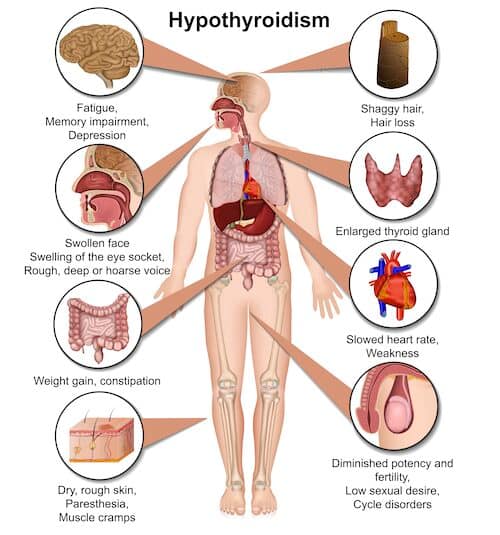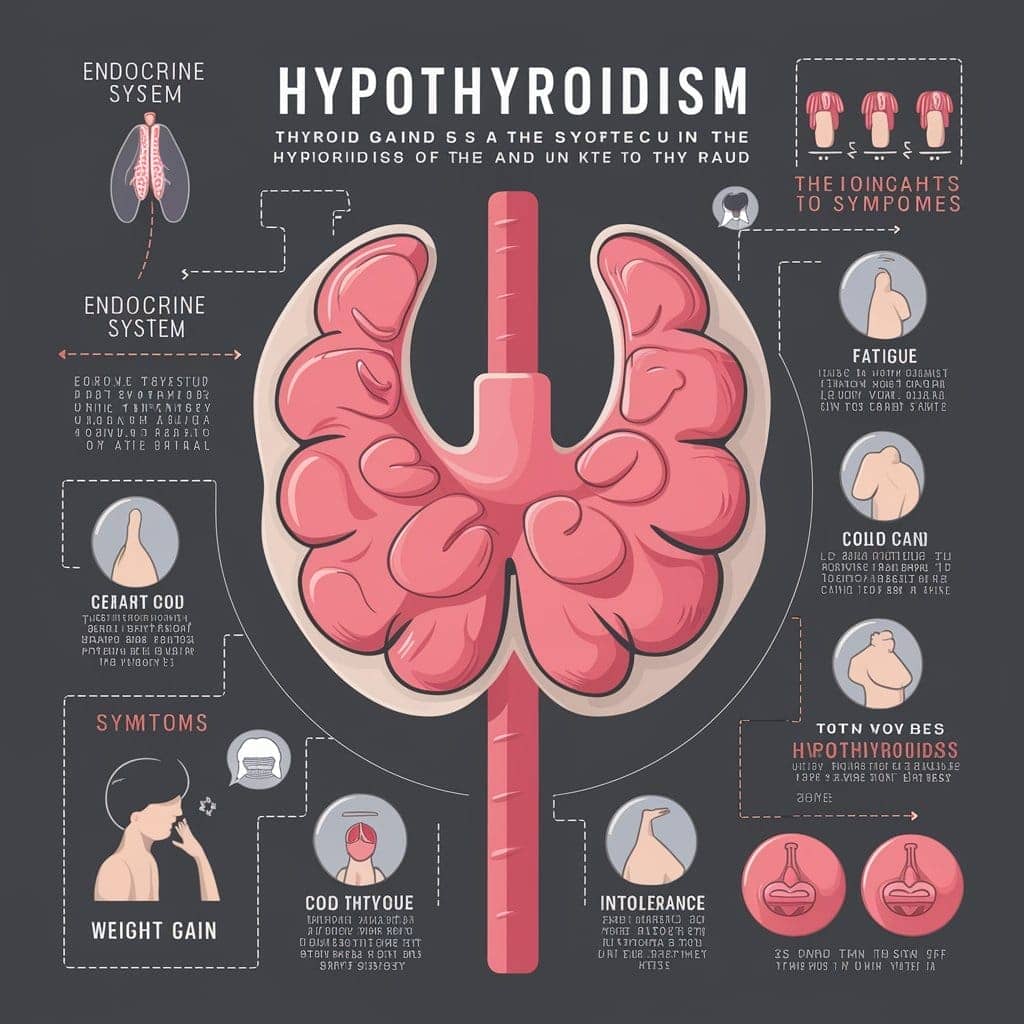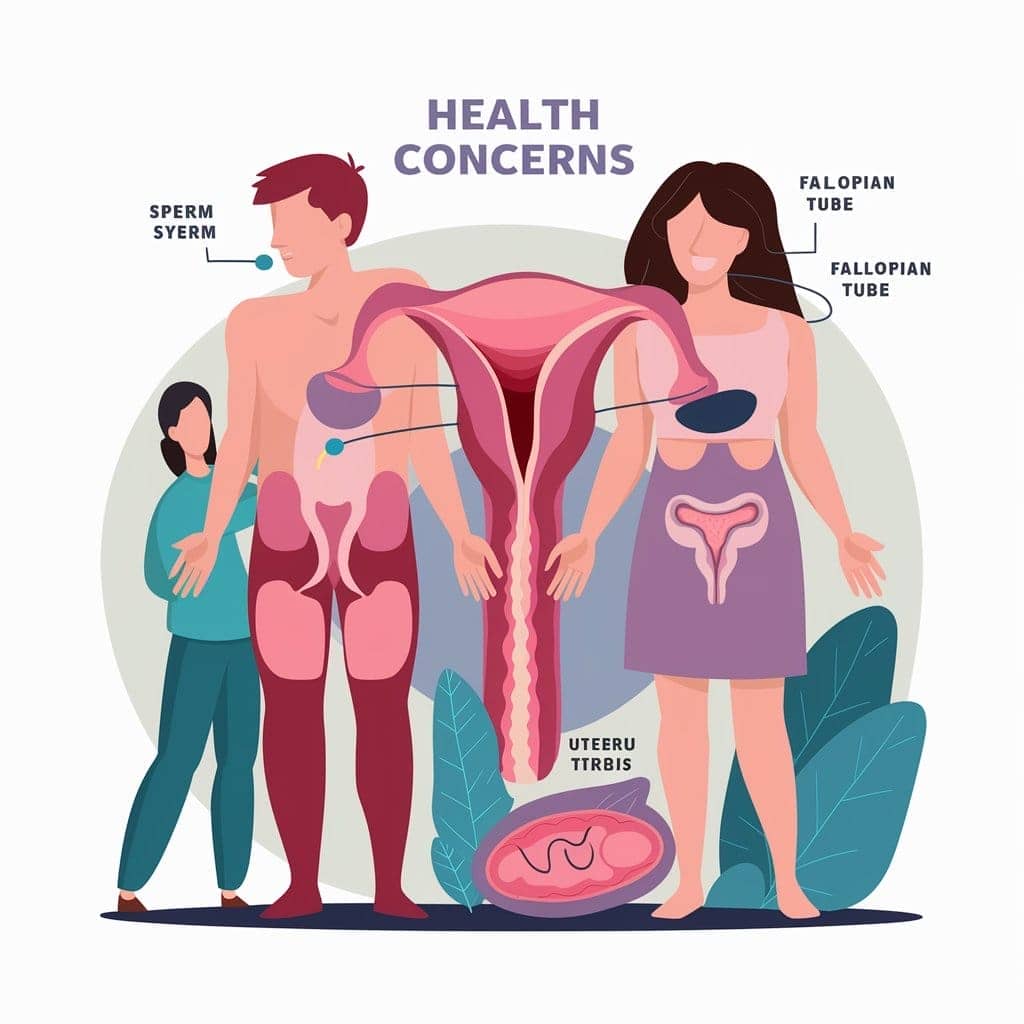A Comprehensive Guide to Hypothyroidism Symptoms and Signs

Hypothyroidism, commonly called underactive thyroid, is a medical condition where the thyroid gland doesn’t produce enough thyroid hormones. It is the most common type of hormonal imbalance and is called hypothyroidism because the levels of thyroid hormone in the blood are too low. The hormone is vital in regulating your body’s metabolism, from energy levels to mood and digestion.
Thyroid Gland
The thyroid is a “butterfly-shaped” gland located at the base of the neck, just below the Adam’s apple. The gland is responsible for secreting hormones that control body metabolism. The thyroid comprises two primary lobes connected by a small strip of thyroid tissue known as the isthmus.
The gland comprises thyroid tissues, which store and produce the thyroid hormones (Triiodothyronine and Thyroxine) that regulate the body’s metabolic rate. The secretion of these hormones is broadly controlled by the anterior pituitary gland through the hormone Thyroid thyroid-stimulating hormone.
The hormones T3 and T4 are necessary for the body’s energy and heat production. For instance, T3 and T4 affect the heart rate and how fast food is converted to energy. The gland also produces calcitonin, a hormone responsible for controlling blood levels of calcium and modifying bone metabolism.
Causes of Hypothyroidism
Hypothyroidism occurs when the thyroid fails to produce sufficient amounts of thyroid hormones that keep bodily functions in good operation.
Some of the causes of hypothyroidism include the following:
-
Hashimoto’s Disease: The Big Culprit
The most common reason your thyroid slows down is Hashimoto’s disease. This is an autoimmune disorder, meaning your own body’s defenses start attacking the thyroid gland by mistake. Over time, this inflammation makes it harder for the thyroid to do its job. -
Medical Treatments:
Sometimes, treatments designed to help other health conditions can inadvertently affect your thyroid. For example:- Radiation Therapy: If you’ve had radiation treatment to your neck area for a medical condition, this can damage thyroid cells and lead to hypothyroidism.
- Thyroid Surgery: Removing part or all of the thyroid gland during surgery can reduce or completely halt thyroid hormone production.
-
Iodine Issues: Too Much or Too Little Iodine is a building block for thyroid hormones. Too little iodine makes it tough for your thyroid to keep up. However, in rare cases, getting too MUCH iodine can also throw your thyroid out of balance.
-
Pituitary Gland Problems: Your thyroid works under the direction of a tiny gland in your brain called the pituitary gland. When something goes wrong with the pituitary, it can’t signal the thyroid properly, resulting in lower thyroid hormone levels.
-
Pregnancy and Beyond Pregnancy can trigger thyroid inflammation (thyroiditis) in some women. While often temporary, sometimes this leaves lingering hypothyroidism after the baby is born.
-
Congenital Hypothyroidism: Some babies are born with an underdeveloped or non-functioning thyroid gland. This requires lifelong treatment to ensure healthy development.
Risk Factors of Hypothyroidism
Thyroid complications, whether too much or too little of a thyroid hormone is produced, affect the elderly more compared to the young. However, congenital hypothyroidism is widespread among infants at 1000 births, while young females are at a higher risk of hypothyroidism. Individuals with autoimmune disorders such as vitiligo, rheumatoid arthritis, lupus, and diabetes mellitus, among others, are more likely to suffer from hypothyroidism compared to those without. The following conditions and lifestyle factors predispose individuals to an enhanced risk of hypothyroidism:
- Pregnancy raises the chances of postpartum thyroiditis
Having other autoimmune diseases - Being over 60 years old can cause the thyroid to stop producing enough hormones
- Complexities during thyroid gland removal processes
- Radiation therapy and disorders with thyroid tumor development
- Iodine and Selenium Deficiency: The two nutrients aid in the production of the thyroid hormone
Symptoms of Hypothyroidism
Imagine that your body always feels a little ‘off’. You’re exhausted, even after a full night’s sleep. That stubborn extra weight just won’t budge. The cold makes you shiver to the bone, and you always seem to be turning up the thermostat. Sound familiar? These could be signs of hypothyroidism, a condition where your thyroid gland isn’t making enough essential hormones.
Common Signs of an Underactive Thyroid:
- Fatigue That Never Seems to Go Away: Feeling sluggish and tired all the time, no matter how much you rest.
- Weight Gain (or Trouble Losing Weight): Despite your best efforts, the scale might creep up or stubbornly stay the same.
- Feeling Extra Cold: Shivering when others are comfortable, needing extra layers, even in warmer weather.
- Dry Skin and Hair: Your skin might feel rough and itchy, and your hair might feel brittle or fall out more than usual.
- Brain fog: difficulty concentrating, forgetfulness, or feeling like you’re in a daze.
- Mood changes: feeling down, depressed, or less interested in things you used to enjoy.
- Muscle Aches and Weakness: Feeling sore, stiff, or weaker than usual.
- Changes in Your Period: Heavier or longer periods, or irregular cycles.
Mental Health Conditions: Depression and rapid-onset dysthymia
Low Production of Other Hormones: The pituitary gland fails to make enough stimulant hormones affecting other glands In severe cases, hypothyroidism can cause a dangerous disease called myxedema. Unfortunately, most cases of myxedema can be triggered by any incidence that involves reduced thyroid hormone production, worsening as age progresses and affecting people with a high susceptibility to the illness.
However, the disease may be triggered by sedatives, cold exposure, and infections, as well as using narcotic pain relievers, among others.
Effects of Hypothyroidism
There are effective treatments that can help eliminate the symptoms. However, proper diagnosis from reliable health providers is mandatory. One can opt to use hormone medications, potentially for life. On the other hand, there is no absolute solution tailor-made to address all patients. With innovation and technology, physicians have adopted several technological advancements to deal with the disease effectively. Research is still in progress to discover further therapeutic procedures that will help provide hypothyroidism patients with better survival chances.
Additionally, essential lifestyle changes such as iodine intake and regular exercise should be incorporated into our lives to mitigate the thyroid problem’s evolving trend. It is also important to control one’s cholesterol levels, which can be done by using dietary changes or medicine.
People should monitor their BMI to avoid being obese or heavy. High cholesterol can lead to heart problems if not properly addressed.
Similarly, goiter can quickly be controlled through iodine and selenium intake in the early stages. However, the problem is more complex and may sometimes require medical attention, depending on the situation. Every disease requires proper preparation and the adoption of the best lifestyle measures.
Low thyroid symptoms can be avoided or minimized if proper measures are implemented in good time. The best preventive measure for hypothyroidism is a regular thyroid examination.
Lastly, the main causes of hypothyroidism include autoimmune responses, medical procedures, medications, iodine deficiency, and pituitary disorders among the elderly. When less thyroid hormone (T-4) production is triggered by the pituitary and hypothalamus, it causes symptoms such as depression, muscle weakness, or fatigue, among others.
Conclusion
The fear of hypothyroidism having power over your health is ungrounded. Just as it might seem when looking for answers, don’t be afraid to experience these body changes and be an advocate for your health. With diagnosis and treatment, you can regain your energy and feel more like yourself again.






